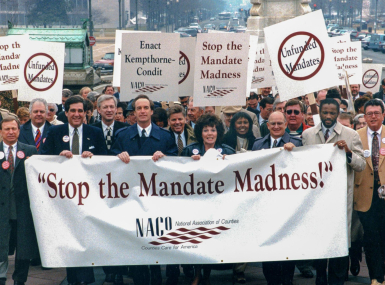Barbara Sharief
Upcoming Events
Related News

County Commissioner
Broward County, Fla.
Why are you interested in serving as a NACo officer?
As a hardworking native Floridian, with roots in farming and agriculture, growing up in a large urban county, owner of a home healthcare company, and mother of 3 beautiful children, I want to continue my public service with the opportunity to support my peers across the country in advancing county-focused policies. As the first African-American woman to be sworn in as Mayor of Broward County, if chosen to serve in NACo Leadership, I’ll be able to show other elected officials that all barriers to diversity can be broken. My commitment to continuing to advance our country’s efforts toward full diversity and equality cannot be understated.
Our country is facing many unique challenges, and by standing together, we can provide opportunities and solutions to further NACo’s vision to have healthy, vibrant and safe counties across the United States.
What do you consider to have been your most important contribution to the National Association of Counties to date? What do you consider to have been your most important contribution to your state association of counties?
I believe my most important contribution to NACo to date has been my service on the NACo Health Steering Committee, where I strongly supported the following efforts:
Smart Medicaid reformation that allows for anti-fraud measures without affecting benefits for medically needy children and adults.
- Legislation that supports initiatives and programs to recruit, train, license and retain health professionals, and allied health professionals and paraprofessionals, on an expedited basis, due to a lack of accessibility to health care and provider shortage.
- Legislation that would request Congress to support bills that would allow individuals in custody to continue receiving Medicaid and other federal benefits until they are convicted.
- Legislation to request mental health and substance abuse issues be funded in the federal budget.
- Legislation to address the opioid crisis and provide funding for national education and awareness.
Since my election as a Broward County Commissioner I have been actively involved with the Florida Association of Counties (FAC). Specifically, at the state level, serving on the Health and Human Services Policy Committee, FAC Board of Directors, and most recently as FAC’s President and Past-President. I have used my experience in the healthcare industry to advocate for various health care initiatives. Another important contribution was realized when I served as Chair of the Health and Human Services Policy Committee. In this capacity, my contributions included:
Supporting legislation to assist county health departments with managing indigent care funding and prevent unfunded mandates by the state to pass on their share of these costs.
Being instrumental in settling a 20-year dispute with the Florida Department of Juvenile Justice concerning the sharing of secure detention costs with the state. Working together with the leaders of our 67 counties and FAC, we were able to reach an agreement with the state and pass legislation that saved our counties significant dollars.
- Drafting and supporting legislation to support Medicaid reform that protected the most vulnerable populations of children and medically complex young adults.
- Drafting and supporting legislation to ensure veterans and their families have access to healthcare in a more efficient manner.
- Supporting a statewide lawsuit against Florida’s Agency for Healthcare Administration retroactive Medicaid billing claim and worked for 10 months to settle Broward County’s estimated $37 million liability resulting in a final reduced claim amount of $2.5 million.
- Supporting legislation to declare the opioid crisis a state of emergency for Florida’s counties.
- Supporting legislation against texting while driving.
Additionally, as FAC President, I fiercely advocated against unfunded mandates and increased local control, as well as healthcare reform for all county governments.
What do you consider to be the two or three most important challenges facing NACo in the near future on which the Officers/Executive Committee/Board of Directors should focus? Why?
While there are many challenges facing NACo in the near future, the most important challenge all our counties face is economic stability, particularly in strong agricultural counties that are constantly being threatened by unfunded mandates from their states. It is essential that we support agricultural businesses to keep hardworking farmers and agricultural suppliers operating so we can feed Americans.
Our second challenge is undoubtedly the opioid epidemic, and the issue of mental health and substance abuse. NACo is and can continue to play a critical role given that this epidemic affects all counties – large and small – rural and urban – rich and poor. Mental health and substance abuse issues have also been in the forefront of major news outlets daily. We must work together, along with our federal and state partners, to explore common-sense solutions that will combat both issues for the benefit of our impacted local communities. Some possible solutions include more training programs and funding for law enforcement, as well as identifying and assisting individuals with mental health issues within our respective communities and providing them the necessary treatment. In addition, a larger number of substance abuse programs should be established and increased funding be made available for communities to combat the opioid epidemic through educational and rehabilitative programs.
A third challenge we face is continued support for our veterans. Our veterans sacrifice their lives for us to maintain our freedoms and to be safe in our country. We must do more for them when they come home from their service. Specifically, we need to focus on providing better mental health care benefits. Veterans suffering from PTSD must be able to access needed health care services, including seeing a doctor, in a timely manner. In addition, as county leaders, we must work with Congress to ensure our veterans receive the best quality health care America has to offer. Our veterans should know they are not alone in their struggles, and through our actions, we can demonstrate to them that we care for them, respect them, and greatly appreciate their service to our great nation. When veterans return home, they also struggle to find a job. We must encourage government and the private sector to provide veterans with better job placement, so they may support themselves and their families. Finally, the GI bill, post September 11th, only gives veterans 36 months to obtain a degree – this does not allow them to obtain a master’s degree without incurring debt. We should encourage Congress to expand the GI Bill to allow more time for veterans to obtain a higher education, thus enabling them to be placed in better jobs.
What measures would you recommend to increase and retain NACo membership and to encourage broad participation in NACo by elected officials and employees of NACo member counties? What specific role would you be willing to assume to help build and sustain membership in NACo?
Across the country there are over 3,000 counties; some 2,300 are members of NACo (about 75%). In 2017, over 2,000 county officials attended a NACo event, and over 1,300 county officials representing over 700 counties serve on NACo committees. These statistics show that NACo’s member engagement initiative is working, but more must be done to reach 100%. The numbers also show there are many county officials that are hungry to work with NACo to advocate on national policy, pursue transformational county solutions, and enrich the public’s understanding of the important role our county governments play in their lives.
To retain, as well as increase membership, I would focus on NACo’s widespread accomplishments in specific policy and advocacy areas.
To increase participation, I would encourage NACo to host more webinars and summits, which address specific issues counties face and challenge members to develop reasonable solutions that can be implemented by member counties.
NACo should also encourage county officials and employees who participate in affiliate groups to participate in NACo committees and NACo’s advocacy, research and education programs as well, thereby broadening participation in NACo.
I would also recommend using surveys as a tool to identify the difficulties or obstacles preventing non-member counties from joining NACo. Surveys can also be used to gauge members’ interests and, in turn, offer programs that benefit their respective counties.
Feedback to members on the success of NACo programs would act as a stimulant to further county membership and participation in NACo.
Attachments
Related News

Tumultuous ’80s test NACo’s fundamentals
NACo took two entrepreneurial risks in the 1980s — one nearly bankrupted the organization and the other has gone on to pay dividends for more than 40 years.

NACo Board approves new outreach campaign, new affiliate
NACo will launch a public awareness campaign in 2026 promoting the role of county governments to federal policymakers.
